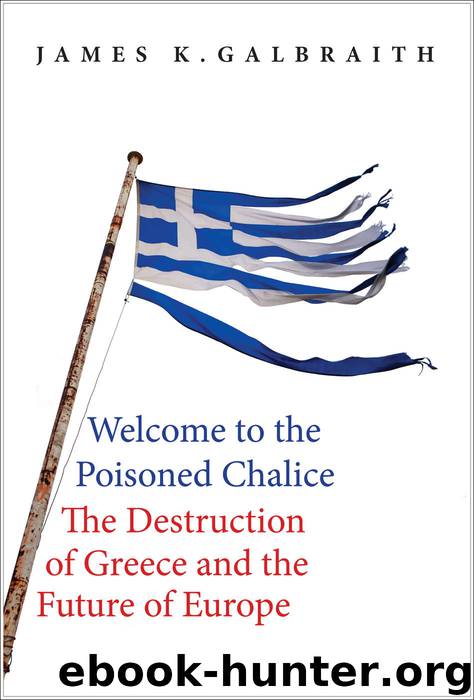Welcome to the Poisoned Chalice: The Destruction of Greece and the Future of Europe by James K. Galbraith

Author:James K. Galbraith [Galbraith, James K.]
Language: eng
Format: epub
Publisher: Yale University Press
Published: 0101-01-01T00:00:00+00:00
TWENTY-ONE
Notes on the Meeting, Varoufakis-Schäuble, June 8, 2015
The meeting was very cordial and confirmed for me that the two have a candid relationship, rooted in mutual appreciation. It began with Schäuble making an amusing gesture: the gift of a small handful of chocolate euros, “for your nerves.”
YV then opened by saying that he had no mandate for further discussion of Schäuble’s prior suggestion that they discuss a referendum that might lead to exit, and that he knew that Schäuble also had no such mandate.1 Therefore there could be no such discussion. Schäuble acknowledged this with an air of resignation, although on this question he clearly disagreed with his instructions.
YV then stated that in his view we are heading toward a “historic failure” for which the political leadership of Europe will be held to account, given its failure to exercise control over the institutions. The most important manifestation of this is the June 1 draft SLA [staff-level agreement] from the institutions, which was a major step backward, toward the MoU [memorandum of understanding], taking almost no account of the progress in the Brussels negotiations, and none of the red lines of the Greek government. In producing the proposed SLA, a more favorable draft from the Commission was brushed aside. The conclusion in Athens is that the ultimatum was mainly the work of the IMF, which wants no agreement without the restructuring that it cannot get from the Europeans. Hence it appears that the Europeans have lost effective control of the negotiations. Nevertheless, it will be the elected political authorities that will be responsible.
YV went on to propose a plan for ending the crisis. It is that a single set of conditions, acceptable to both sides, be agreed to as the basis for (a) closing the second program, and (b) restructuring the debt per the Greek nonpaper on ending the crisis, which would have the effect of putting Greece into Q[uantitative] E[asing] and thus restoring market access and ending the crisis. The essential elements are (a) refinancing the ECB SMP bonds through the ESM, using SMP profits to pay the IMF, and returning to the markets under QE.2 The conditions would include a realistic target for the primary surplus, a debt brake, an independent tax authority, tax enforcement, pension reforms and other measures, consistent with core Greek positions on labor markets, low-end pensions, and privatizations. There would be no new loan money for the Greek state. Schäuble listened to the presentation at length with close attention and body language that suggested no disagreement on any point of the argument. YV stated repeatedly that a solution should be definitive and not a predicate for further failure and ongoing bailouts. It would have to be accompanied by an investment program, arranged through the EIB and elsewhere at the same time.
The most important fact about Schäuble’s response was that he said, repeatedly and with a shrug, that he has “no idea” about how to resolve this matter, and “no authority” to negotiate against the preferences of the institutions.
Download
This site does not store any files on its server. We only index and link to content provided by other sites. Please contact the content providers to delete copyright contents if any and email us, we'll remove relevant links or contents immediately.
50 Economics Classics by Tom Butler-Bowdon(2571)
Six Billion Shoppers by Porter Erisman(2302)
Why Nations Fail: The Origins of Power, Prosperity, and Poverty by Daron Acemoglu & James Robinson(2297)
No Time to Say Goodbye(2117)
Red Notice by Bill Browder(2081)
Currency Trading For Dummies by Brian Dolan(1929)
The Economist [T6, 22 Thg9 2017] by The Economist(1926)
Thank You for Being Late by Thomas L. Friedman(1770)
Bitcoin: The Ultimate Guide to the World of Bitcoin, Bitcoin Mining, Bitcoin Investing, Blockchain Technology, Cryptocurrency (2nd Edition) by Ikuya Takashima(1699)
Amazon FBA: Amazon FBA Blackbook: Everything You Need To Know to Start Your Amazon Business Empire (Amazon Empire, FBA Mastery) by John Fisher(1575)
Coffee: From Bean to Barista by Robert W. Thurston(1545)
The Future Is Asian by Parag Khanna(1484)
The Great Economists by Linda Yueh(1454)
How Money Got Free: Bitcoin and the Fight for the Future of Finance by Brian Patrick Eha(1425)
Grave New World by Stephen D. King(1420)
Pocket World in Figures 2018 by The Economist(1418)
Capitalism Without Capital: The Rise of the Intangible Economy by Jonathan Haskel(1401)
The Sex Business by Economist(1386)
Cultural Intelligence by David C. Thomas(1289)
